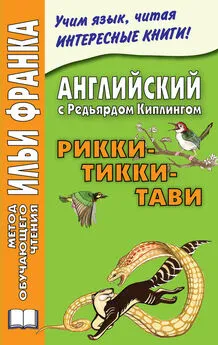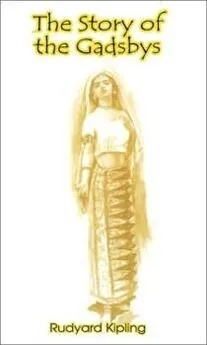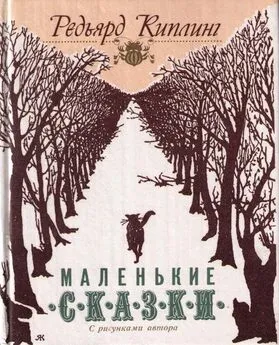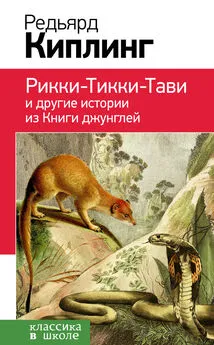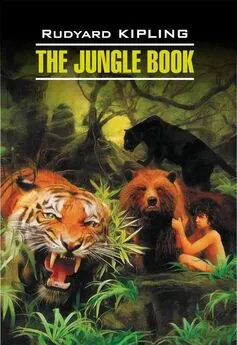Редьярд Киплинг - Английский с Редьярдом Киплингом. Рикки-Тикки-Тави / Rudyard Kipling. Rikki-Tikki-Tavi
- Название:Английский с Редьярдом Киплингом. Рикки-Тикки-Тави / Rudyard Kipling. Rikki-Tikki-Tavi
- Автор:
- Жанр:
- Издательство:Литагент «Восточная книга»1243df63-7956-11e4-82c4-002590591ed2
- Год:2012
- Город:Москва
- ISBN:978-5-7873-0610-1
- Рейтинг:
- Избранное:Добавить в избранное
-
Отзывы:
-
Ваша оценка:
Редьярд Киплинг - Английский с Редьярдом Киплингом. Рикки-Тикки-Тави / Rudyard Kipling. Rikki-Tikki-Tavi краткое содержание
В книге представлены новеллы из знаменитой «Книги джунглей» Редьярда Киплинга (1865–1936), адаптированные (без упрощения текста оригинала) по методу Ильи Франка. Уникальность метода заключается в том, что запоминание слов и выражений происходит за счет их повторяемости, без заучивания и необходимости использовать словарь.
Пособие способствует эффективному освоению языка, может служить дополнением к учебной программе. Предназначено для широкого круга лиц, изучающих английский язык и интересующихся английской культурой.
Английский с Редьярдом Киплингом. Рикки-Тикки-Тави / Rudyard Kipling. Rikki-Tikki-Tavi - читать онлайн бесплатно ознакомительный отрывок
Интервал:
Закладка:

 Still, the instant’s delay brought Rikki-tikki up to her, and as she plunged into the rat-hole where she and Nag used to live, his little white teeth were clenched on her tail, and he went down with her – and very few mongooses, however wise and old they may be, care to follow a cobra into its hole. It was dark in the hole; and Rikki-tikki never knew when it might open out and give Nagaina room to turn and strike at him. He held on savagely, and stuck out his feet to act as brakes on the dark slope of the hot, moist earth.
Still, the instant’s delay brought Rikki-tikki up to her, and as she plunged into the rat-hole where she and Nag used to live, his little white teeth were clenched on her tail, and he went down with her – and very few mongooses, however wise and old they may be, care to follow a cobra into its hole. It was dark in the hole; and Rikki-tikki never knew when it might open out and give Nagaina room to turn and strike at him. He held on savagely, and stuck out his feet to act as brakes on the dark slope of the hot, moist earth.
Then the grass by the mouth of the hole stopped waving(затем трава около входа в нору перестала качаться; to wave – волноваться, качаться, колыхаться; wave – волна ) , and Darzee said, “It is all over with Rikki-tikki(c Рикки-Тикки все кончено) ! We must sing his death song(мы должны спеть песню /по поводу/ его смерти = похоронную песню) . Valiant Rikki-tikki is dead(отважный Рикки-Тики мертв) ! For Nagaina will surely kill him underground(потому что Нагайна обязательно убьет его под землей) .”
So he sang a very mournful song that he made up on the spur of the minute(и он запел очень печальную песню, которую сложил, вдохновленный данным моментом; to make up – выдумывать; spur – шпора / на обуви / ; побуждение, стимул ) , and just as he got to the most touching part(но как только он дошел до самой трогательной ее части; to touch – / при / касаться, трогать; трогать, волновать ) , the grass quivered again(трава снова зашевелилась; to quiver – дрожать мелкой дрожью; колыхаться ) , and Rikki-tikki, covered with dirt(и Рикки-Тикки, /весь/ покрытый грязью) , dragged himself out of the hole leg by leg(выбрался: «вытащил себя» из норы лапа за лапой; to drag – тащить, волочить ) , licking his whiskers(/и/ облизывая свои усы; to lick – лизать ) . Darzee stopped with a little shout(Дарзи остановился = замолчал , слегка вскрикнув; shout – крик ).

 Then the grass by the mouth of the hole stopped waving, and Darzee said, “It is all over with Rikki-tikki! We must sing his death song. Valiant Rikki-tikki is dead! For Nagaina will surely kill him underground.”
Then the grass by the mouth of the hole stopped waving, and Darzee said, “It is all over with Rikki-tikki! We must sing his death song. Valiant Rikki-tikki is dead! For Nagaina will surely kill him underground.”
So he sang a very mournful song that he made up on the spur of the minute, and just as he got to the most touching part, the grass quivered again, and Rikki-tikki, covered with dirt, dragged himself out of the hole leg by leg, licking his whiskers. Darzee stopped with a little shout.
Rikki-tikki shook some of the dust out of his fur and sneezed(Рикки-Тикки стряхнул немного пыли со своего меха и чихнул; to shake ) . “It is all over(все кончено) ,” he said. “The widow will never come out again(вдова никогда больше не выйдет наружу) .” And the red ants that live between the grass stems heard him(красные муравьи, которые живут между стеблями трав, услышали его) , and began to troop down one after another to see if he had spoken the truth(и потянулись стайкой вниз друг за другом, чтобы /пойти/ посмотреть, правду ли он сказал; to troop – собираться толпой; строить / ся / ; troop – отряд, группа людей ).
Rikki-tikki curled himself up in the grass and slept where he was(Рикки-Тикки свернулся в траве и заснул там, где был = прямо на месте; to sleep ) – slept and slept till it was late in the afternoon(/он/ спал и спал до конца дня = до вечера; late – поздний, поздно; afternoon – время после полудня, дневное время ) , for he had done a hard day’s work(потому что в этот день он выполнил тяжелую работу).

 Rikki-tikki shook some of the dust out of his fur and sneezed. “It is all over,” he said. “The widow will never come out again.” And the red ants that live between the grass stems heard him, and began to troop down one after another to see if he had spoken the truth.
Rikki-tikki shook some of the dust out of his fur and sneezed. “It is all over,” he said. “The widow will never come out again.” And the red ants that live between the grass stems heard him, and began to troop down one after another to see if he had spoken the truth.
Rikki-tikki curled himself up in the grass and slept where he was – slept and slept till it was late in the afternoon, for he had done a hard day’s work.
“Now(теперь) ,” he said, when he awoke(проснувшись; to awake – будить; просыпаться ) , “I will go back to the house(я вернусь в дом) . Tell the Coppersmith, Darzee(скажи /о случившемся/ птице Меднику, Дарзи; coppersmith – медник; котельщик; copper – медь; smith – кузнец ) , and he will tell the garden that Nagaina is dead(и он расскажет всему саду, что Нагайна мертва) .”
The Coppersmith is a bird who makes a noise exactly like the beating of a little hammer on a copper pot(Медник – птица, которая создает шум = издает звук , в точности напоминающий удары маленького молотка по медной кастрюле; like – подобный, похожий; to beat – бить ) ; and the reason he is always making it is because he is the town crier to every Indian garden(причина того, что он всегда делает /именно/ так, в том, что он является городским глашатаем каждого сада в Индии; to cry – кричать; crier – крикун; городской глашатай ) , and tells all the news to everybody who cares to listen(и сообщает все новости всем, кто имеет желание слушать; to care – беспокоиться, тревожиться; иметь желание ) . As Rikki-tikki went up the path(когда Рикки-Тикки пошел по дорожке; up – зд.: вглубь, по / обозначает движение вглубь страны, территории /) , he heard his “attention” notes like a tiny dinner gong(он услышал его призывы «внимание», напоминающие /звон/ крошечного обеденного гонга; note – нота; крик, зов, звук / особ. издаваемый птицами /) , and then the steady “Ding-dong-tock”(а потом равномерное «динг-донг-ток»; steady – устойчивый; равномерный, ровный ) ! Nag is dead – dong(Наг мертв – донг) ! Nagaina is dead(Нагайна мертва) ! Ding-dong-tock(динг-донг-ток) !”

 “Now,” he said, when he awoke, “I will go back to the house. Tell the Coppersmith, Darzee, and he will tell the garden that Nagaina is dead.”
“Now,” he said, when he awoke, “I will go back to the house. Tell the Coppersmith, Darzee, and he will tell the garden that Nagaina is dead.”
The Coppersmith is a bird who makes a noise exactly like the beating of a little hammer on a copper pot; and the reason he is always making it is because he is the town crier to every Indian garden, and tells all the news to everybody who cares to listen. As Rikki-tikki went up the path, he heard his “attention” notes like a tiny dinner gong, and then the steady “Ding-dong-tock! Nag is dead – dong! Nagaina is dead! Ding-dong-tock!”
That set all the birds in the garden singing(это заставило всех птиц в саду запеть; to set – класть, ставить; приводить / в какое-либо состояние /) , and the frogs croaking(а лягушек квакать; to croak – каркать; квакать ) , for Nag and Nagaina used to eat frogs as well as little birds(потому что Наг и Нагайна, бывало, поедали и лягушек так же, как и маленьких птиц).
When Rikki got to the house(когда Рикки подошел к дому) , Teddy and Teddy’s mother(Тедди, мать Тедди) (she looked very white still, for she had been fainting(она все еще выглядела очень бледной, так как упала до этого в обморок = что оправилась от обморока; to faint – падать в обморок ) ) and Teddy’s father came out and almost cried over him(и отец Тэдди вышли /ему навстречу/, чуть не плача над ним) ; and that night he ate all that was given him till he could eat no more(и в тот вечер он ел все, что ему давали, пока не смог /уже/ больше есть; to eat ) , and went to bed on Teddy’s shoulder(и отправился в постель = спать на плече Тэдди) , where Teddy’s mother saw him when she came to look late at night(где мать Тедди /и/ увидела его, когда пришла взглянуть /на своего мальчика/ поздно ночью).

 “That set all the birds in the garden singing, and the frogs croaking, for Nag and Nagaina used to eat frogs as well as little birds.
“That set all the birds in the garden singing, and the frogs croaking, for Nag and Nagaina used to eat frogs as well as little birds.
Интервал:
Закладка:
